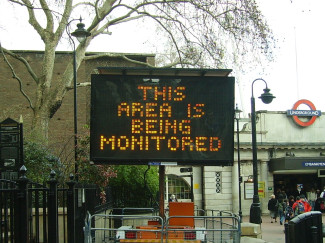
Image courtesy of David Curran via Creative Commons license on Flickr.
You are being watched. And snooped upon. And recorded. I’m not just talking about the NSA, either. Big brands are watching and listening to you online. They want to know what you like, what you don’t like, what you talk about, and who your friends are.
And employers and recruiters are watching, too.
Does this creep you out? Do you think your Tweets, your likes, and your professional connections are nobody else’s business? Or do you welcome it? Is your social media presence a giant, flashing, neon sign for your personal and professional brand? Either way, the trends are clear. Social recruiting is growing rapidly and going nowhere any time soon.
So, the question becomes, “Is this an Orwellian invasion of privacy or is it an opportunity to market yourself to employers?”
 Social Recruiting Trends
Social Recruiting Trends
Each year, social recruiting software provider Jobvite publishes their annual Social Recruiting Survey. Consider the following facts from their 2014 survey results:
- 93% of recruiters and companies use social media for talent acquisition and evaluation
- 93% of recruiters will review a candidate’s social profile before making a hiring decision
- 73% of employers plan on increasing their investment in social recruiting – more than any other acquisition channel
- 55% of recruiters have reconsidered a candidate based on their social media profile
It’s not just that recruiters and companies are looking up your social media profiles. Entire industries are being born to assist companies with sorting through the increasingly long list of applicants. Here’s an excerpt from a recent Forbes article titled, The 9 Hottest Trends In HR Technology … And Many Are Disruptive:
A flurry of new companies (Identified, Gild, TalentBin, Entelo, and others) are now skipping I/O psychology and helping recruiters source candidates by analyzing their social data. While a test is a good way to understand someone, so is looking at everything they’ve ever posted on the internet. Even LinkedIn now offers a tool that lets recruiters look at all the social activity of candidates to better understand who they know, what they’re reading, and what they’re writing about.
This is a dramatic change in the way we source candidates. While this technology does not replace scientific assessment, it goes around it. And since buyers can’t easily tell the difference between assessment providers (making them seem like a commodity), assessment companies are getting into the Big Data business too.
Let that sink in for a minute. I’ll wait…
So, employers are also using social media to assess their current employees. Let’s take a look at two different perspectives with regard to this social media surveillance state.
The Orwellian View
Many people will liken this to a police state. Although it’s legal for cameras to record people in public, there is lots of debate about how much is appropriate and how those recordings can and should be used by the government and police. I’ve heard similar arguments with regard to social media.
Scanning someone’s public social media profile is fair game. If you don’t want your Tweets searchable, you can set your profile to private. The same is true on Facebook. You can even lock down your profile on LinkedIn if you so choose.
However, given the trends identified, locking down your social media profiles could cost you opportunities in your career. Certainly, you will be shielding yourself from potential negative impact. But the converse is also true; that you will be shielding yourself from potential positive impact.
The Opportunistic View
Many people will view this trend as an opportunity to showcase and market their value to prospective employers. Done carefully and deliberately, social media can be an excellent way to define and promote your personal brand.
However, many adults (and most young adults) underestimate the visibility of their social profiles and post content that can negatively impact their career opportunities. Another Forbes article mentioned data from Careerbuilder that reveals some of these perils:
A third (34%) of employers who scan social media profiles said they have found content that has caused them not to hire the candidate. About half of those employers said they didn’t offer a job candidate the position because of provocative or inappropriate photos and information posted on his or her profile; while 45% said they chose not to hire someone because of evidence of drinking and/or drug use on his or her social profiles. Other reasons they decided not to offer the job: the candidate’s profile displayed poor communication skills, he or she bad mouthed previous employers, made discriminatory comments related to race, gender, or religion, or lied about qualifications.
The Bottom Line
Obviously, this boils down to a personal preference for job seekers. Some are extremely uncomfortable on social media and prefer to be more or less invisible. The downside to this approach is that it makes you harder to find and harder to evaluate against other candidates with more complete and polished social media footprints.
Others use social media on a regular basis and have constructed strong personal brands. As the Forbes article pointed out, however, there are lots of potential pitfalls to this approach that can have negative consequences.
It’s important to understand the tradeoffs of each approach and be deliberate in whichever philosophy you apply to your professional online profile.

No comments yet.